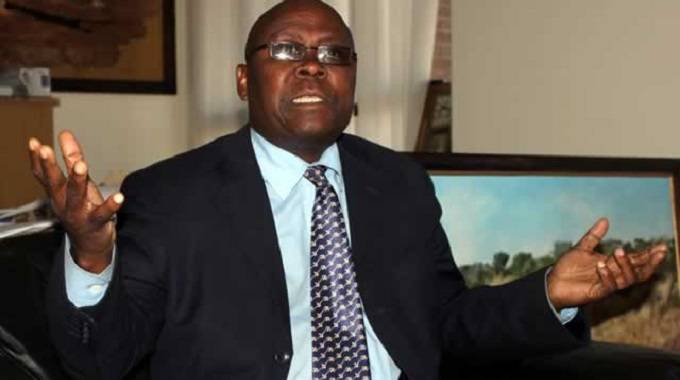Perspective: Laugh at disability when dead

Stephen Mpofu
Home Affairs and Cultural Heritage Minister Cain Mathema may not have been off the mark when he suggested earlier this week that State employees planning a demonstration over what they called “deteriorating conditions of service” could surreptitiously have been intent on regime change in Zimbabwe above all else.
An even more frightening prospect is that those teachers and nurses agitating for strike action may have done so under the spell of Machiavellian political hot heads driven by insatiable hunger for political power and that power at any cost; otherwise why thumb their congested noses at the round table, the legitimate and civilised route to finding lasting solutions to both teething and old challenges that bedevil any society, including our own?
It was all very well for Minister Mathema to say that the police and other security agencies kept an eagle’s eye to ensure law and order was maintained.
But must the security agents now forget the strike action threats as inconsequential bygones and leave it at that?
This pen and no doubt other concerned citizens will say a big NO to that and instead urge the State security protectors to go beyond the strike threats and ferret out its agitators to discover their true political colour so the culprits may receive their just deserts for trying to cause mayhem in the country.
Teachers and nurses are not the only people affected by difficult economic conditions, marked at present by commodity prices that have gone haywire, making life difficult for virtually everybody but in particular the worker, not to mention the majority of Zimbabweans in rural areas.
Now imagine what would happen were the strike by the nurses and teachers to go on with all other workers in the country following suit under the hysterical belief that work stoppages would bring solutions to current problems?
The obvious answer is that the country would grind to a halt with the Government rendered helpless to do anything about it and so technically and effectively out of power.
Does any Zimbabwean today wish to experience dog-eat-dog conditions that existed in colonial Rhodesia or do freedom and independence not mean maturity and civilised methods in the way we grapple with challenges that are bound to occur time and time again in the carnal world in which we live?
It should be remembered that the genesis of Zimbabwe’s economic woes was the foreign response through illegal economic sanctions against this country’s land reform programme in the early years of this country’s independence and meant to restore to the legitimate black owners land seized by those without knees during the colonial era.
Since that landmark decision things have really never been quite rosy, with the sanctions making the economy grow by fits and starts and so to no really blossoming point, especially with the West which imposed the financial and economic sanctions refusing to remove them to give Zimbabwe an economic renaissance it so deserves.
What is even crazier in our economic difficulties is that some Government employees demand payment of their salaries in United States dollars, which makes the black market in Zimbabwe blossom so that for business that currency has become a sine qua non for successful life for those with access to the currency but a dog’s life for those who cannot put their fingers on it.
But Zimbabwe is not a colony of the United States of America for it to continue to use the dollar as the chief currency in the same way that Rhodesians as the colonised people of Great Britain used the Pound Sterling as their currency.
At any rate, because we do not produce the dollar here smugglers can freely clean out the money and take it to whatever destination they wish leaving the country virtually bankrupt because we do not mill the US dollar here in Zimbabwe.
And, anyway, what legitimate reasons are there for allowing the parallel market, pejoratively called the black market to exist side by side with the legal money market?
In fact would it be wrong to suggest that the parallel market is the one that has inspired some power hungry politicians to want to set up a parallel government to the existing one under the belief that such an administration will be just as popular as the parallel market even though the constitution of the country has no room for that form of government?
The solution is to have our own currency and support it by all means possible at our disposal, rather than have it play second fiddle to currencies of other nations.
Today Zambians may be justified in saying to us: “laugh at disability when dead.”
Those Zimbabweans who lived in exile in our northern neighbour, while the freedom struggle went on in this country, will remember how foreigners including some of our own people mocked Zambians, saying they collected their salaries in wheelbarrows and by that suggesting that the Kwacha was valueless.
But what happened to our own Zim dollar after independence when we failed to keep it strong and it became valueless to run into trillions and now we have bonds which play second fiddle to foreign currencies, making life extremely difficult for people.
Something must really be done to improve our economy and with that our currency and Zimbabwe will be on the run again and not be open to contemporary imperialism through whatever means possible.
When their economy went through difficult patches, the Zambians clung tenaciously to their currency, the Kwacha, a walking stick and today that country enjoys a buoyant economy with their strong currency executing the Kwacha dance and with no black market or parallel market causing any threat to it.
Other countries that have not tolerated the black market as we in Zimbabwe have done still have their economies galloping like race horses, supported by their strong local currencies.
Zimbabweans must make a choice between allowing the black market to completely ruin our currency and with that the economy and with that have and keep a robust local currency to spearhead economic transformation into a brave new future for all.
Unity, peace and stability and a resolute political will form the ingredients for such a durable social economic and political dispensation.









Comments